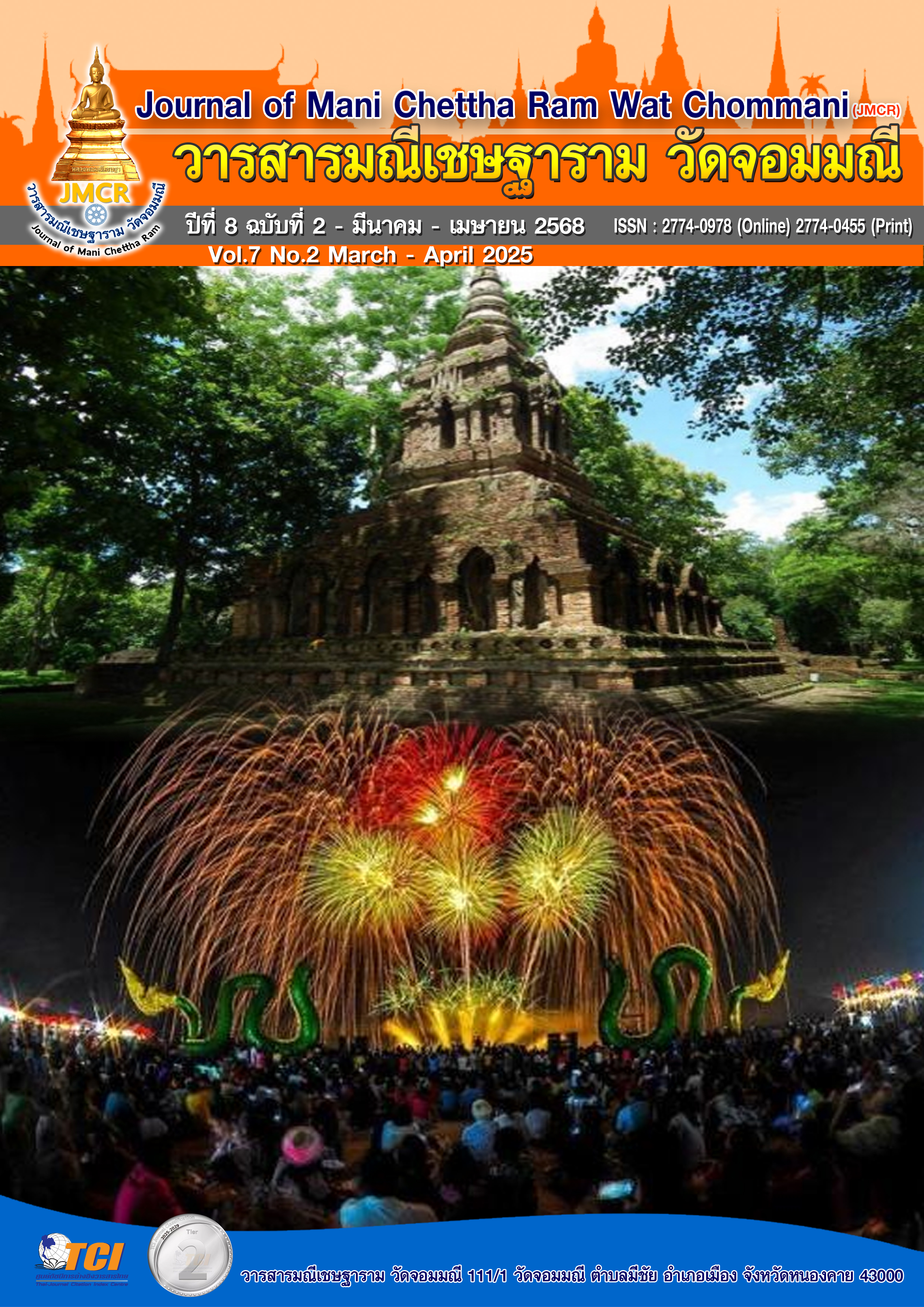GUIDELINES FOR THE DEVELOPMENT OF ACADEMIC ADMINISTRATION THROUGH THE PROFESSIONAL LEARNING COMMUNITY (PLC) PROCESS IN SCHOOLS WITHIN THE DOI LUANG EDUCATIONAL DEVELOPMENT NETWORK
Keywords:
Academic Development, Professional Learning Community (PLC), Educational Development NetworkAbstract
The objectives of this research were: (1) to study the academic management status of schools in the Doi Luang Educational Development Network, (2) to identify best practices in academic administration using the Professional Learning Community (PLC) process, and (3) to propose academic development guidelines based on the PLC process for schools in the network. The sample group consisted of 106 administrators and teachers, selected using Taro Yamane’s formula. The research instruments included questionnaires and semi-structured interviews. Quantitative data were analyzed using mean and standard deviation, while qualitative data were analyzed using content analysis.
The findings revealed that: (1) the overall academic management status in the schools was at a high level ( = 4.32, SD = 0.45). The highest-rated aspect was curriculum development, while the lowest-rated aspect was instructional process development; (2) best practices in academic administration using the PLC process were categorized into four areas of academic work, aligned with the PLC framework; and (3) the academic development guidelines based on the PLC process covered four key areas, with six processes per area, totaling 24 guidelines. The summary of the key guidelines is as follows: (1) Curriculum development focuses on establishing shared vision and values, integrating technology to enhance teaching and learning; (2) Instructional process development emphasizes alignment with student learning goals and the use of digital technology to improve instructional effectiveness; (3) The use of technological media aims to foster shared understanding and enhance teaching quality; and (4) Assessment and evaluation incorporate diverse methods that comprehensively measure knowledge, skills, and desirable characteristics.
References
กมลวรรณ ทิพยเนตร. (2561). การพัฒนาครูในการสร้างนวัตกรรมการจัดการเรียนการสอน โดยใช้กระบวนการ สร้างชุมชนการเรียนรู้ทางวิชาชีพ (Professional Learning community: PLC) ตามโครงการวิจัยและพัฒนานวัตกรรมแลกเป้า สพฐ. ปีงบประมาณ 2561. ขอนแก่น: สำนักงานเขตพื้นที่การศึกษาประถมศึกษาขอนแก่น เขต 1.
กระทรวงศึกษาธิการ. (2564). แผนปฏิบัติการดิจิทัลเพื่อการศึกษา กระทรวงศึกษาธิการ พ.ศ. 2563-2565. กรุงเทพมหานคร: สำนักงานปลัดกระทรวงศึกษาธิการ.
ชวลิต ชูกำแพง. (2564). ชุมชนแห่งการเรียนรู้สู่การวิจัยในชั้นเรียน. วารสารครุทรรศน์,1(1),53-63.
พิมพ์ใจ วรรณชาติ. ปัจจัยที่ส่งผลต่อการบริหารงานวิชาการในโรงเรียนกรณีศึกษาสถานศึกษาขนาดกลาง. วารสารการศึกษาและการพัฒนา,13(2),75-88.
ยาวิระ หลังปูเต๊ะ. (2563).การพัฒนารูปแบบการบริหารงานวิชาการตามแนวคิดการบริหารเชิงกลยุทธ์และชุมชนการเรียนรู้ทางวิชาชีพ (PLC) เพื่อยกระดับผลสัมฤทธิ์ทางการเรียนของนักเรียนโรงเรียนบ้านคลองสองปาก. เรียกใชเมื่อ 28 มีนาคม 2567 จาก https://research.otepc.go.th/v_paper_journal_view.php?editid1=527
ลักษณ์ประภา สุวรรณสมบัติ. (2565). การบริหารงานวิชาการของผู้บริหารที่ส่งผลต่อประสิทธิภาพสถานศึกษาตามแบบชีวิตวิถีใหม่สังกัดสำนักงานเขตพื้นที่การศึกษาประถมศึกษาจันทบุรี เขต 1. ใน ปริญญาครุศาสตรมหาบัณฑิต สาขาวิชาการบริหารการศึกษา.มหาวิทยาลัยราชภัฏรำไพพรรณี.
วิมล เดชะ. (2559). การบริหารงานวิชาการในโรงเรียนดีประจำตำบล สังกัดสำนักงานเขตพื้นที่การศึกษาประถมศึกษาสตูล. ใน สารนิพนธ์ศึกษาศาสตรมหาบัณฑิต.สาขาวิชาการบริหารการศึกษา .มหาวิทยาลัยหาดใหญ่.
ศิวพร ละหารเพชร. (2562). ประสิทธิผลการบริหารงานวิชาการสถานศึกษาขนาดเล็กตามความคิดเห็นของครูสังกัดสำนักงานเขตพื้นที่การศึกษาประถมศึกษาสุราษฎร์ธานี เขต 2. ใน วิทยานิพนธ์ปริญญาครุศาสตรมหาบัณฑิต สาขาวิชาการบริหารการศึกษา.มหาวิทยาลัยราชภัฏสุราษฎร์ธานี.
สมชาย พิพัฒน์กิจไพศาล. (2563). การบริหารงานวิชาการในสถานศึกษายุคใหม่ แนวทางและตัวแบบการพัฒนา. วารสารการบริหารการศึกษา, 11(1), 45-60.
สำนักงานเขตพื้นที่การศึกษาประถมศึกษาเชียงราย เขต 3. (2567). รายงานผลการทดสอบระดับชาติ ปีการศึกษา 2566. เชียงราย: สำนักงานเขตพื้นที่การศึกษาประถมศึกษาเชียงราย เขต 3.




